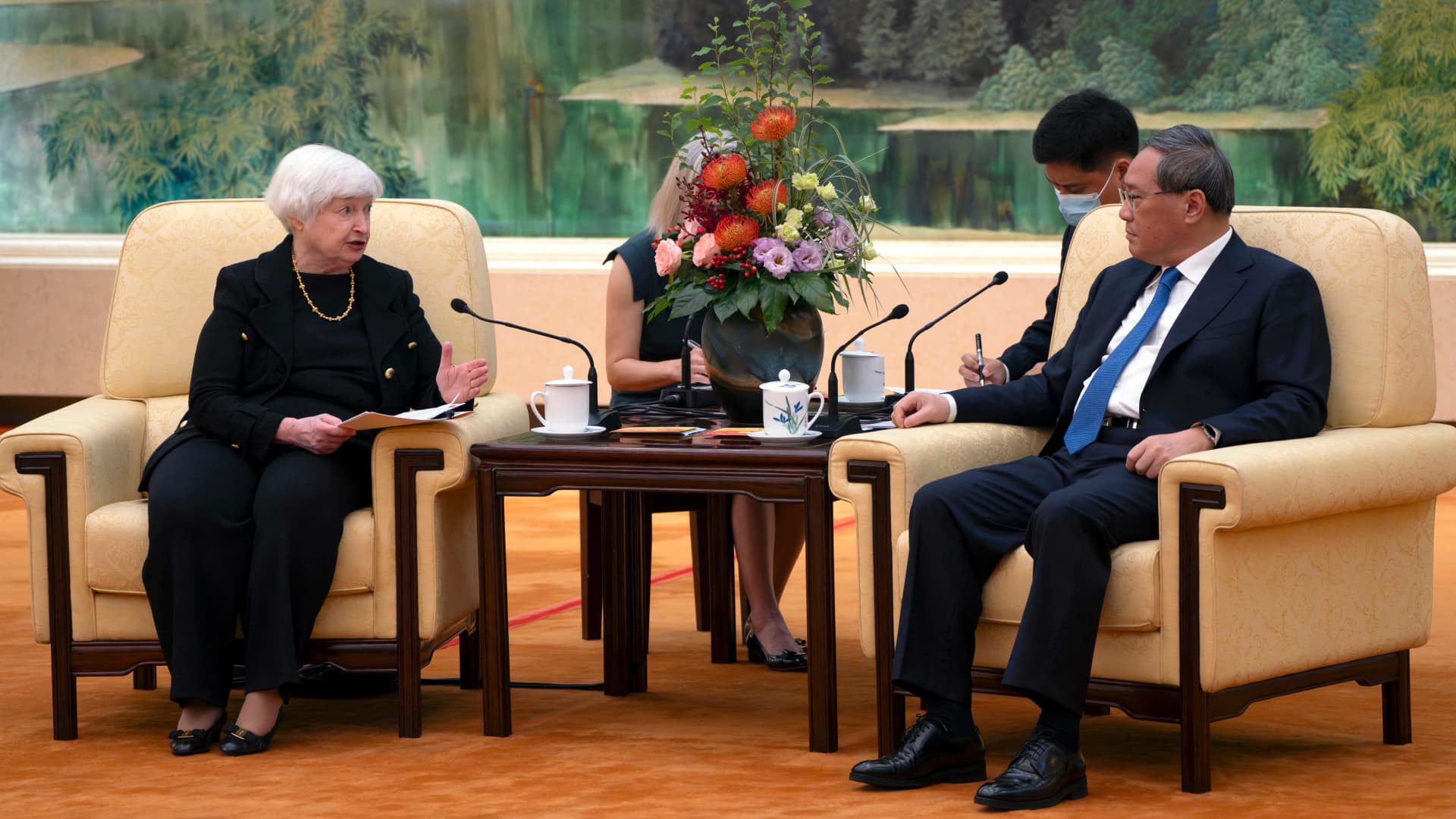BEIJING — U.S. Treasury Secretary Janet Yellen has become the second U.S. Cabinet member to visit China in a month, setting the stage for more high-level communication between the two countries.
In coming days, John Kerry, special presidential envoy for climate, also plans to visit China, he told the The New York Times. The U.S. embassy in Beijing did not immediately respond to a CNBC request for comment.
The multiple trips mark a shift from early this year, when an alleged Chinese spy balloon forced U.S. Secretary of State Antony Blinken to postpone his Beijing travel plans. He did not visit until June.
Geopolitics weighed on the market earlier this year, Yifan Hu, regional chief investment officer and head of macroeconomics Asia Pacific at UBS Global Wealth Management, said Monday in a press briefing about the second-half outlook.
“As long as there are talks and communication between China and the U.S., the market will get used to the new normal,” she said, noting performance will likely be less volatile. That’s according to a CNBC translation of her Mandarin-language remarks.
Official statements from both the U.S. and Chinese sides indicated plans for further talks.
“Differences should not be a reason for estrangement, but rather a driver for strengthening communication and exchanges,” China’s Ministry of Finance said in a statement Monday about Yellen’s visit. That’s according to a CNBC translation of the Chinese text.
The finance ministry said that during the meetings, the Chinese side asked the U.S. to remove tariffs on Chinese goods and stop “pressuring” Chinese companies, among other items.
Increased talks aside, the bilateral relationship has not improved significantly.
Just days before Yellen arrived in China, its Commerce Ministry announced forthcoming export controls on two metals used in the manufacturing of semiconductors.
The U.S. is still mulling investment restrictions on high-end Chinese tech, Yellen confirmed in a press briefing Sunday. She said she told her Chinese counterparts that any curbs on U.S. outbound investments would be “very narrowly targeted.”
Preventing escalation
Greater communication, however, can help set boundaries for government actions.
“My purpose is to make sure we don’t engage in a series of unintended escalatory actions that will be harmful to our economic relationship with one another,” Yellen said in an interview that aired Saturday on CBS News’ “Face the Nation.”
She noted the pandemic contributed to the lack of contact between U.S. and Chinese senior officials, creating “a situation where misunderstandings can develop.”
“And I do think my trip has been successful in forging those relationships and creating the opportunity for a deeper set of more frequent contacts at our staff levels.”
Yellen’s visit this past Thursday to Sunday came about three weeks after Blinken met with Chinese President Xi Jinping in Beijing. Yellen met with people close to Xi, including recently promoted Premier Li Qiang.
“These weren’t counterparts that we had seen at tons of meetings before. And so going in and being able to interact with them talk about a lot of substance was the most important thing,” a senior Treasury official told reporters in a briefing at the close of Yellen’s trip.
The official noted that a meeting with He Lifeng, a vice premier, lasted five hours, more than double the originally scheduled time.
He also leads China-U.S. economic and trade cooperation efforts, according to a state media report that described his meeting with Yellen as “constructive.”
Again, no one meeting will likely yield a breakthrough, but the process will translate into the normalization of direction communication, which itself can help support maintaining a fragile stabilityScott KennedyCenter for Strategic and International Studies
In all, Yellen’s 10 hours of talks during her trip included meetings with Finance Minister Liu Kun and Pan Gongsheng, who was promoted this month to the role of party secretary at the People’s Bank of China.
Yellen also met with former Vice Premier Liu He and former People’s Bank of China Governor Yi Gang, the Treasury said.
“Simply meeting in person and for her and her counterparts to get to know each other is a substantial breakthrough in and of itself,” said Scott Kennedy, senior advisor and trustee chair in Chinese business and economics, at the Washington D.C.-based think tank Center for Strategic and International Studies.
“We should expect visits in both directions by other cabinet officials in the coming months,” he said. “Again, no one meeting will likely yield a breakthrough, but the process will translate into the normalization of direction communication, which itself can help support maintaining a fragile stability.”
Increased high-level meetings between the U.S. and China come with about a year and a half left under the current Biden administration.
In prepared remarks to reporters at the close of her trip, Yellen noted “significant public coverage” of U.S.-China meetings over the past two years.
“My hope is that we can move to a phase in our relationship where senior-level diplomacy is simply taken as a natural element of managing one of the world’s most consequential bilateral relationships.”
